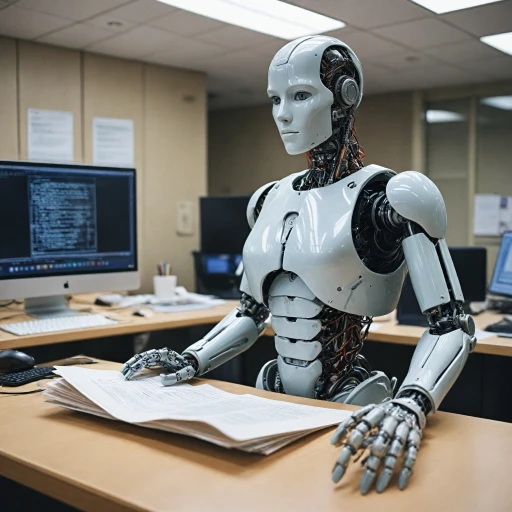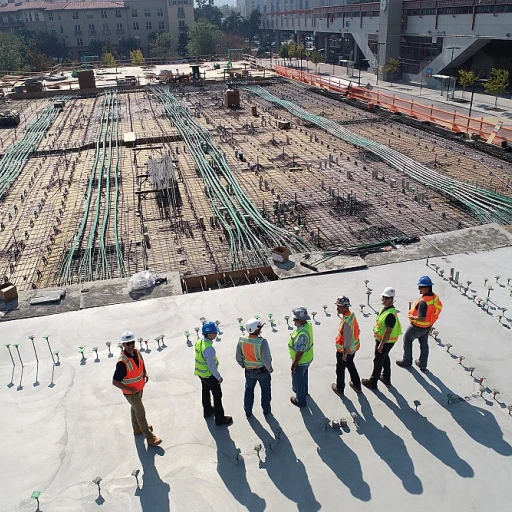
The Evolution of AI in Human Resources
The transformation of human resources through artificial intelligence (AI) is evidence of the advancing technology reshaping the business landscape. Initially, AI was harnessed for simplifying payroll processes, which remains a crucial component of HR operations. However, AI's role has expanded beyond payroll solutions, offering comprehensive support and embracing a broader spectrum of HR activities.
One of the initial deployments of AI in HR was the automation of payroll services, enabling businesses to manage payroll tax, compliance, and filings efficiently. Popular providers like ADP have capitalized on AI-driven payroll software to streamline business payroll and tax filing needs, simplifying payroll time management for small businesses. As AI continues to evolve, its utility transcends simple payroll tasks, paving the way for enhanced employee services.
Beyond processing payrolls, AI technologies now engage in multifaceted roles, supporting HR teams and providing resources to improve overall employee experience. By integrating AI into the workplace, businesses have been able to offer solutions that help manage time tracking, attendance, and even evaluate HR's broader strategic initiatives.
This evolution extends to helping business owners deliver a more personalized and efficient employee experience. AI-driven tools contribute to optimized employee engagement, performance evaluation, and recruitment processes, ensuring long-term business growth.
To fully comprehend how AI has augmented human resources, businesses need to go beyond understanding payroll and acknowledge its broader impacts. By doing so, they can leverage the full potential of AI-enhanced services, further pushing the boundary of innovation in HR.
For more insights on enhancing human resources with AI technology, you can explore deep dives on AI enhancements in HR settings.
AI-Driven Recruitment Processes
Leveraging AI for Smart Candidate Screening
The recruitment process has seen a remarkable transformation as a result of artificial intelligence. For many businesses, especially small businesses, integrating AI into recruitment has delivered benefits like increased efficiency and improved candidate matching. With AI-driven recruitment processes, employers can move beyond traditional practices and focus on more strategic hiring. AI in recruitment goes beyond simply scanning resumes. It helps in identifying the right candidates by analyzing applicants' skills, experiences, and even social media activities. This ensures a more comprehensive understanding of a potential employee's fit within the team. Additionally, AI recruiting solutions allow companies to learn payroll trends and manage compliance related to state and federal regulations more effectively. AI-powered recruitment software helps manage the tedious aspects of hiring, providing companies with the time to focus on their business growth. For instance, time tracking and attendance records can be seamlessly integrated, offering a comprehensive overview of potential hires' previous work behavior. With technology such as predictive analytics, AI enables human resources teams to forecast a candidate's future performance and long-term potential. This analysis supports businesses in their endeavor to assemble a strong and cohesive team, where each member aligns with the company's objectives and culture. However, businesses need to remain cautious about privacy policy concerns as AI recruitment tools sift through extensive amounts of personal data. Balancing these technologies' capabilities with ethical considerations is crucial. If you're interested in more insights into ensuring effective and transparent recruitment practices, you can learn more about functioning AI tools and employment background checks with AI-driven applications. This approach aims to bridge the gap between human intuition and technology, creating a more efficient hiring process.Enhancing Employee Engagement with AI
Fostering a More Engaged Workplace
In today's rapidly evolving world of work, keeping employees engaged is more important than ever. AI solutions are proving to be a game-changer for businesses, especially for small businesses that often struggle with resources. AI-driven platforms can collect and analyze feedback in real-time, enabling human resources to tailor engagement strategies and improve the overall employee experience. AI tools help track and manage employee satisfaction with precision. For instance, AI can assess patterns in feedback from team members and suggest actionable insights for HR professionals. This empowers businesses to swiftly address grievances and enhance compliance with a more significant focus on individual needs. Moreover, AI's capacity extends beyond payroll management; it offers services like time attendance, performance tracking, and even fostering a culture of open communication and support. By leveraging AI, businesses can better coordinate resources, boosting engagement and promoting long-term business growth. With AI supporting the development and well-being of employees, companies can create a thriving work environment that retains talent and maximizes productivity. In an era where privacy policy concerns loom large, AI-driven engagement platforms prioritize employee privacy while providing comprehensive analytics. Business owners must remain cautious of ethical considerations, ensuring transparent communication around how AI tools are utilized in their workplace. Integrating AI in engagement efforts is a strategic move to decrease employee turnover and enhance satisfaction, fostering loyalty and harmony within teams. For more insights on how AI is transforming human resources, explore this in-depth analysis.AI in Performance Evaluation
Revolutionizing Employee Assessment through AI
AI offers an innovative lens into performance evaluation, shifting beyond traditional methods. In the evolving world of human resources, AI is not just a tool but a transformative force that provides business owners with insights into employee performance, which extends beyond payroll management or simple compliance tasks. Modern businesses, regardless of size, benefit from AI-driven solutions that analyze patterns and predict outcomes. Performance evaluation is no longer limited to periodic reviews but is an ongoing process that is data-driven and objective.- Data-Driven Insights: AI-based systems track employee performance by analyzing time attendance and work outputs. This helps in creating a detailed picture, free from human bias.
- Real-Time Feedback: AI facilitates continuous feedback mechanisms. This not only supports employee engagement but also helps in their long-term growth.
- Objective Evaluations: AI-driven solutions reduce discrepancies in performance reviews by basing them on objective data, providing equal opportunities and fair assessments for all employees.
Challenges and Ethical Considerations
Addressing Ethical Concerns and Compliance
As artificial intelligence continues to transform human resources, it brings with it a host of challenges and ethical considerations that businesses must navigate. While AI-driven solutions offer significant benefits beyond payroll, such as enhancing recruitment processes and employee engagement, they also raise important questions about privacy and compliance.
One of the primary concerns is data privacy. With AI systems processing vast amounts of employee data, from payroll to performance evaluations, ensuring compliance with state and federal privacy policies is crucial. Business owners must ensure that their AI solutions adhere to regulations like GDPR and other local data protection laws to safeguard employee information.
Bias and Fairness in AI Systems
Another significant challenge is addressing bias in AI algorithms. While AI can streamline recruitment and performance evaluations, there's a risk of perpetuating existing biases if the algorithms are not carefully managed. This can lead to unfair treatment of employees, affecting team morale and business growth. Companies need to invest in developing fair and transparent AI systems that support diversity and inclusion.
Balancing Automation and Human Touch
AI in human resources offers solutions that can save time and improve efficiency, especially for small businesses. However, it's essential to strike a balance between automation and the human touch. While AI can handle tasks like payroll services and time tracking, human resources teams must ensure that employees still receive personalized support and services.
Moreover, as AI continues to evolve, businesses must be prepared for long-term changes in how they manage their workforce. This includes adapting to new technologies and continuously learning about the latest AI developments to remain competitive in the market.
Ensuring Ethical AI Implementation
To address these challenges, companies should establish clear guidelines and ethical frameworks for AI implementation. This includes regular audits of AI systems to ensure compliance and fairness, as well as providing training for HR professionals to effectively manage AI tools. By doing so, businesses can harness the full potential of AI while maintaining trust and integrity in their human resources practices.
The Future of AI in Human Resources
Anticipating Tomorrow's HR Landscape
As we look to the future, artificial intelligence is poised to redefine the human resources domain far beyond payroll processes. The integration of AI in various aspects of HR, such as recruitment, employee engagement, and performance evaluation, promises to create a more efficient and responsive work environment. But what does this mean for small businesses and their employees?
A crucial aspect of AI's role in HR is enhancing the manageability of resources while simultaneously offering support in compliance and privacy policy adherence. Future innovations in AI could automate payroll tax calculations and time tracking, relieving small business owners from cumbersome administrative tasks. By streamlining tax filing and other payroll services, AI allows HR teams to dedicate more time to strategic planning and employee development, fostering long-term business growth.
However, while AI offers numerous solutions for business optimization, its transition into HR must be handled carefully. The core focus should always be on maximizing the benefits for employees, ensuring that AI doesn't overshadow the human element.
The potential for AI in HR also extends into the domain of cloud-based software services like ADP, which integrates AI enhancements for improved payroll and time attendance systems. Improving efficiency in these areas is essential for facilitating a seamless employee experience.
Ultimately, the future of AI in human resources brims with possibilities. It promises to empower HR teams to move beyond traditional duties, emphasizing their role as strategic partners in their organizations. The challenge lies in balancing technological advancements with ethical responsibilities, ensuring that every step towards AI adoption considers the human factor at its core.













